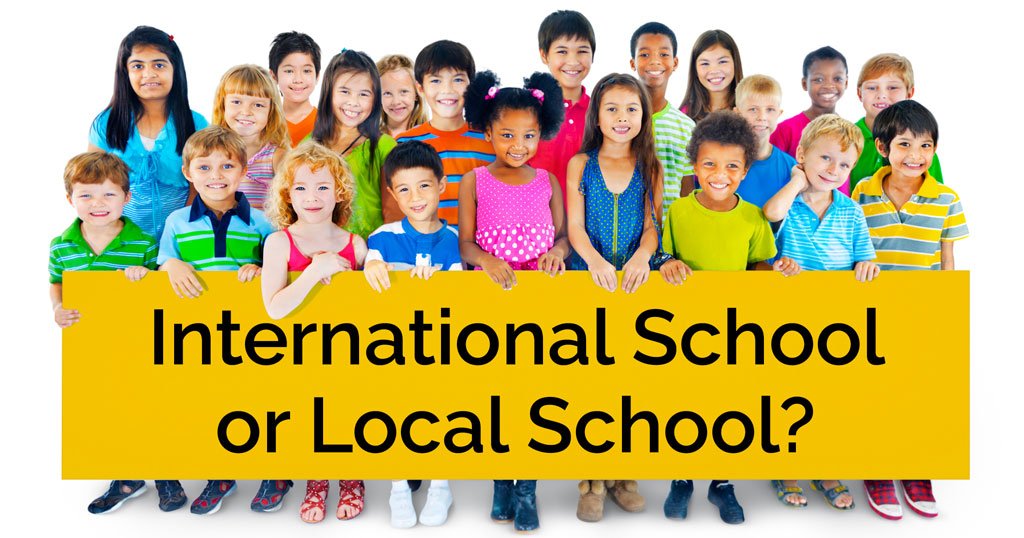International school or local school: A complex decision
Now that the economy has begun recovery, families who selected local schools abroad because of financial constraints – either imposed by corporate policy or their own finances – may once again have the option to enrol their children in international schools. However, interest in developing globally competent children has followed the practical shortage of funds available for international schooling, so parents moving to another country today may experience greater confusion in choosing between local and international schools– unable to predict what is best for the child in the short run as well as ultimately. This article is designed to shed some light on the decision.
Understand the alternatives:
International schools
International schools originally were founded to serve expatriate populations. Many of the early international schools were founded as a result of a foreign state department or military presence in a country. In today’s global economy, demand from multinational corporations has vastly increased the number of international schools in destinations where these companies have a significant presence. In some cases groups of companies joined together to start a school. Most commonly demand for international education led to founding an international school by a third party – sometimes a “not-for-profit” and other times a” for-profit” entity.
International school instruction may be offered in a language other than that of the host country. They also offer choices for families who prefer curriculum and/or school-leaving qualifications not available through the local school system. International schools were created in response to expatriate families’ desire to preserve their home culture as well as a concern for the ability of their children educated abroad to repatriate and resume entry into their home educational system. International schools also provide a built-in community for expatriates and therefore typically extracurricular activities and events are available every day of the week.
International schools can be defined by their curriculum: they either offer a national curriculum other than that of the host nation, and/or they teach a specifically international curriculum such as the International Baccalaureate. While they cater to international families for the most part, during the economic downturn many international schools survived by accepting local students. Therefore schools that boasted an international demographic composition until recently may now have limited space for international students as the local population is more stable than the former mobile population. In cases where demographics have changed substantially, the character of the school may have changed as well. Therefore it is wise for parents to inquire about the relative mix between local and international students if they are deliberately choosing an international school for the diversity it offers.
Local schools
Language is the obstacle most commonly thought of when a family evaluates local schools as an alternative for their children. But integrating families into a local educational system where culture, goals, philosophies and teaching methods are new suggests complexity beyond language and requires a different type of preparation on the part of the family.
Parents selecting local schools should be thinking about issues as mundane as the calendar of the school year (will they be able to coordinate their home leave), the length of school day (do they need childcare in the afternoons), lunch (is the local custom to expect children to eat everything on their plate), homework customs as well as parental involvement, which differ widely between cultures. In addition, parents can be confident that an international school community can open up an entirely new life for them while living abroad. Does the local school provide a network of welcoming parents?
While financial considerations and an interest in fostering global competency have stimulated a new level of interest in local schools among internationally mobile families, even these parents can be quite uneasy about relocating with children unless and until they understand the local educational system and curriculum differences in their new country.
Consider these facts:
- Some local schools in India consider handwriting so important that teachers may not consider content if handwriting falls short of expectations.
- A study by the University of New Hampshire indicates in many European countries, parental involvement is not permitted.
- In some countries, schools “stream” students into tracks as early as 12 years old, and this could affect the ability to gain admission to universities in other countries. Admissions decisions based on an “entry examination” or prerequisites make this a clear challenge for those who do not have the language or curriculum background.
- Religious education is a fundamental part of national curriculum in many countries, such as Ireland. This may meet an unenthusiastic response from families not accustomed to such arrangements or those that practice a different religion. And, even if considered acceptable, students may not have the religious background to fit in.
- Special education is handled in varied ways throughout the world, from mainstream educational options in the United States, to China, where few schools have an open-minded approach, and few teachers are taught to teach children with learning or other disabilities.
Tips for success:
Here is a short checklist that companies and their assignees with children may find helpful in examining educational options before any overseas assignment, as well as before their eventual return home:
- Allow time and provide assistance for families to review the curriculum of schools in the host country, and discuss it with teachers back home. Identifying specific areas where a child may be ahead or behind enables parents and schools to put in place supplemental programs to assist children in entry as well as re-entry.
- Provide opportunity for students to become proficient in reading and writing as well as speaking of the new language well before the move; in fact, as soon as the move is announced is best.
- Recommend that families bring along books, course outlines and any other available materials so that they can, if desired, maintain academic skills that children are missing while abroad.
- Suggest that families learn the exit requirements for schools in the home country well before leaving an overseas assignment. These, in particular, will determine curriculum areas that a child may wish to continue to study while abroad. Consider supplemental or alternative education to ease the transition for children, particularly at key grade levels. These may include tutoring, on-line courses, summer school, home schooling or boarding schools.
- If re-entry at a particular grade will be totally incompatible, is it possible for the employee or the family to repatriate either a year earlier or later, as appropriate to facilitate the transition?
- Engage a professional who understands discrepancies in curriculum as well as culture to recommend individualized support so that students can be prepared before returning home.
There is no doubt that the experience of attending a local school and learning first-hand about a different culture can’t be surpassed. Families who have overcome these obstacles and successfully educated their children in local schools find the rewards to be significant. Children truly learn new languages, cultures and curricular subjects and enjoy an unprecedented window into the customs of a different country. As schools are a microcosm of the cultures they inhabit, children raised in local schools abroad can be our true ambassadors in the global world of the next generation. However, children who have attended local schools in remote areas may be unprepared to attend school back home or even to know the process for enrolling in university in their home country.
Parents should understand that whether the child attends international or local school abroad, repatriation always is difficult. Even international schools of the child’s home nationality vary the curriculum, offer courses in different sequences, offer different foreign languages and certainly promote different viewpoints when teaching history.
When considering local as well as international schools for a child during an overseas assignment, be sure to pay careful attention to home and host country requirements before the assignment begins. The steps indicated above are offered to make for a softer landing.
via International School or Local School: A Complex Decision | Expat International Schools. Thursday, August 19, 2010
EXPAT EDUCATION: My book on choosing the right school for YOUR child overseas
Choosing the right school for your child is one of the hardest decisions you’ll make as an expat parent when moving abroad. There are many education options around for expats, and so much depends on your individual family set-up and child that there is no ‘one-school-fits-all’ solution.
Each child is different and each country’s school system is different, even within the ‘generic’ international schools. Also, families differ in their requirements and aspirations, and even relocations vary greatly. What worked well for you all in one country won’t necessarily be replicated in your next move.
It’s easy to get very stressed at this point. Don’t panic! I’ve put together this book to help you kick-start your search for the best type of school for your child.
Available on your local Amazon
To get instant access to the key points you need to know right now, check out my abridged version eBook here




I don’t know if this website is pretty exclusively aimed at native English speaking expats, but one possible advantage to international schools not specifically mentioned in this article is the possibility of continuing study of the mother tongue (other than the language of instruction, which in many cases is English). More international schools are acknowledging the importance of valuing and enabling or at least advocating the study of the mother tongue. That is key to understanding the home culture mentioned in the article. This is not universally a feature of international schools, but thankfully it is on the increase!
I’m afraid I don’t quite follow this – when you say ‘mother-tongue’, do you mean the language of the country you’re in or a third language spoken by the child? So language #1 would be the language of tuition – English; language #2 is the language of the host country ie Japanese and language #3 is the mother-tongue of the child?
In my experience the language of the host country is a mandatory lesson and has been prevalent in all the international schools I’ve seen. And of course would be the primary language of local schools. There may be the option of another language or two depending on the curriculum etc.
Or of course I may have totally misunderstood your comment!
We have our kid in a local school – the international one was the first option as we are moving every 2-3 years, but it is too expensive so we couldn’t afford it. He’s going to a local school and he’s quite happy, has friends of all nationalities, and has no problems with the language (he learnt at the nursery too) – to be honest, is us with the homework who get a bit “lost”
But we know that if we move, we have to find something similar to the current education he’s receiving, so I guess we would have to choose a British school, but that’s fine, we try not to make a big deal of it and solve problems when they arise
Thank you for your comments, Esther. I’m glad your kid is happy at his local school; certainly being immersed in a new language and culture is easier for some children and learning the language at nursery was a great start for him!